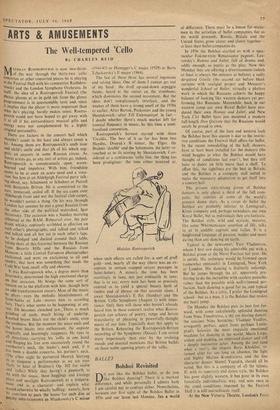_ARTS & AMUSEMENTS
The Well-tempered 'Cello
By CHARLES REID
WISTISI-AV ROSTROPOVICH is now two-thirds of the way through the thirty-two 'cello concertos or other concerted pieces he is playing at the Festival Hall with his compatriot Rozhdest- yensky and the London Symphony Orchestra. In "self, the idea of a Rostropovich Festival (the Phrase gleams at us in gold ink from the glossy programmes) is in questionable taste and, since it implies that the player is more important than what he's playing, hardly makes sense. Rostra- Povich could not have hoped to get away with n at all if his extraordinary musical gifts and "ergs/ were not complemented by a highly original personality. There are factors in the concert hall which shouldn't count in the least and always count a lot. Among them are Rostropovich's snub nose and child's smile and that jib a his which sug- gests an auguste in some Russian circus. As Soviet artists go, as any sort of artists go, indeed, kostropovich is conspicuously open, warm- hearted and impulsive. With him, friendship seems to be at once an acute need and a voca- !ton. See him at an Aldeburgh Festival party talk- ittB about, say, Schumann or Schubert or Purcell With Benjamin Britten. He is committed to the core, immersed, sealed off. If the sea came over Aldeburgh front and wet the festival club carpet, he wouldn't notice a thing. On his way through 1-°ndon last summer he met a great Russian from the other side of the political watershed, Igor Stravinsky. The occasion was a Sunday morning rehearsal at the RAM. Rehearsal over, the pair drank whisky, copiously scribbled in affection on each other's photographs, and talked and talked dnd talked and all but sat in each other's laps. As he dodged and ducked around their table, taking shots of this fraternal between the Russian f..„43n1 Beverly. Hills and the Russian from moscow, a little Central Eutopean photographer exclaimed, and went on exclaiming to all and ,...,sundrY, that here was something that made the "Id War look small silly and obscene. It was Rostropovich who, a degree more than Stravinsky, determined the high emotional charge °n that ocdasion. He brings the same sort of tension on to the platform with him, though here Lan odd transformation occurs. Most of the music Ze. Plays -even the melodic blandishments of -i.aint"saeris or Lalo—moves him to scowling 'tirY. That's what seems to be happening. at any rate. Jib becomes clenched jaw.,There is much grinding of teeth, much biting of underlip. Knotted brows black out the child's smile, even the snubness. But the moment the piece ends and the house blazes into enthusiasm, the auguste n'agicallY and beamingly reappears. He runs in 411 directions, carrying his 'cello in one hand dnd flinging his free arm successively round the `unductor's neck, the leader's neck and, if it has been a double concerto, his partner's neck. 9 he other night he partnered Henryk Szeryng ;11. as eloquent a performance as we are ever ikelY to hear of Brahms's Op. 102 for violin and 'cello.) While they havev't a pennorth to do with the music, these huggings and kissings Place and spotlight Rostropovich as a tempera- °lent and as a character -and explain what Would otherwise be wholly baffling: namely, how he contrives to pack the house for such dim or Patchy entertainments as Miaskowsky's C minor
(1944-45) or Honegger's C major (1929) or Boris Tchaikovsky's E major (1964).
The last of these three has several ingenious and taking ideas. One of them I cannot get out of my head: the droll up-and-down arpeggio theme. heard at the outset on the trombone, which dominates the second movement. But the ideas don't conspicuously interlock, and the weaker of them have a strong smell of the 1930s or earlier. After Bartok, Prokoviev and the young Shostakovich—after Till Eulenspiegel, in fact- 1 doubt whether there's much market left for ironical.flippancy in music, by this time a semi- fossilised convention.
Rostropovich's harvest started with three Vivaldis. The best of it so far has been two Haydns, Dvorak's B minor, the Elgar. the Brahms 'double' and the Schumann, the latter re- touched as to its scoring by Shostakovich. Con- sidered as a continuous 'cello line, the thing has been prodigious: the tone either honeyed or,
Mstislav Rostropovich
when such effects are called .for, a sort of gruff gold-- and, nearly all the way (there was an ex- ception in certain stopped octave passages in Saint-Saens's A minor), the tone has been startlingly in tune, not just ordinarily in tune; that is to say, every note has been so precisely centred as to yield a special beauty both of timbre and of phrase on that account alone. I await Shostakovich's E flat (Sunday) and the Britten 'Cello Symphony (August 1) with impa- tience. Only then will those who haven't already heard him in these contexts realise what Rostro- povich can achieve of poetry, range and heroic muscularity of phrasing in powerfully-thought music of our time. Especially does this apply to the Britten. Rehearing the Rostropovich-Britten recording of the Symphony (Decca), I am seized more imperiously than ever by the evolving moods and musical mansions that Britten builds on those noble opening grunts of the 'cello.
















 Previous page
Previous page